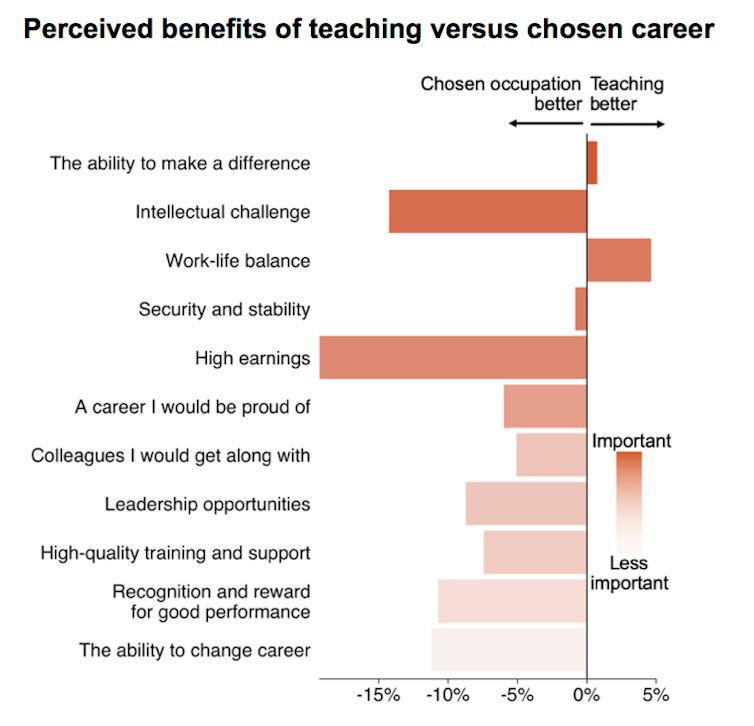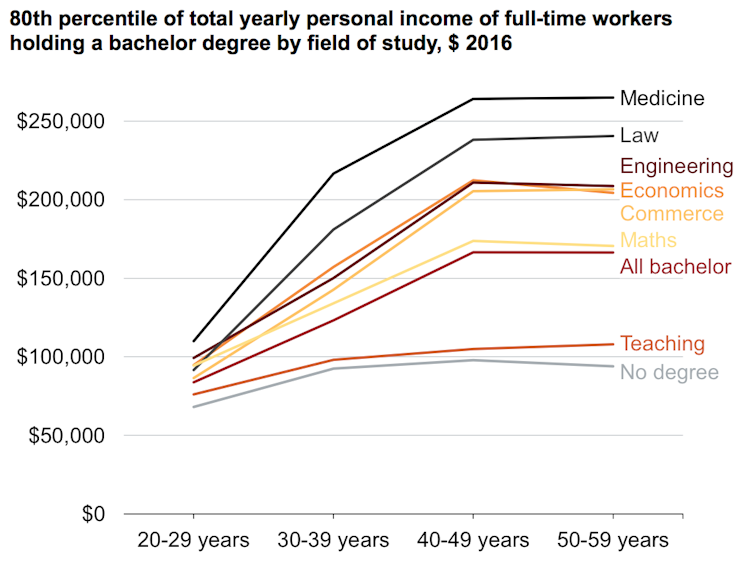here's how to get our top students to become teachers
- Written by Peter Goss, School Education Program Director, Grattan Institute
Australia’s young high achievers are turning their backs on teaching. They want to make a difference in their careers, and they are interested in teaching, but when it comes to the crunch they choose professions with better pay and more challenge.
This is not just a cultural problem – governments can and should do more to make teaching an attractive career for our best and brightest. If they don’t, we’ll feel it for generations to come.
A Grattan Institute survey of 950 young high achievers Australia-wide shows what might change their minds. In our new report, Attracting high achievers to teaching, we propose a reform package that would transform the teaching workforce within a decade.
Read more: Here's how to support quality teaching, with the evidence to back it
Attracting high achievers
More high achievers in teaching would mean more student learning. International evidence shows teachers who are good learners themselves do a better a job in the classroom. One New York City initiative cut the achievement gap between the poorest and richest schools by a quarter simply by encouraging high achievers to become teachers in poorer schools.
But in Australia, demand from high achievers for teaching has steadily declined over the past 40 years. As top-end salaries for teachers became less competitive with other professions, fewer high achievers chose to teach.
Over the past decade, high-achiever enrolments in teaching courses fell by a third – more than for any other undergraduate field of study.
Today, only 3% of young high achievers choose teaching in their undergraduate studies, compared with 19% for science and 9% for engineering.
Better pay and more challenge
Our survey of young high achievers (aged 18-25 and with an ATAR of 80 or higher) found the best and brightest would take up teaching if it offered better top-end pay and greater career challenge.
This does not mean young people today are not altruistic. In fact, all higher achievers in our survey said they wanted to make a difference. But they thought they could do so in any number of better-paid careers.
 Grattan Institute survey of 950 young high achievers, Author provided
High achievers’ big worry was that they would get stuck in the one classroom, doing the same thing over and over again. They knew teaching is a tough job, but they wanted greater intellectual challenge and “the ability to move forward”. As one respondent told us:
It feels like teachers don’t have a clearly defined career progression path.
High achievers also know that teaching falls short on pay. They estimated that by the time they reached the top of their chosen career, they would be earning A$142,000 a year. That’s a very achievable goal in fields like law, engineering, and commerce. But for teachers, that sort of salary is only a very remote possibility.
Grattan Institute survey of 950 young high achievers, Author provided
High achievers’ big worry was that they would get stuck in the one classroom, doing the same thing over and over again. They knew teaching is a tough job, but they wanted greater intellectual challenge and “the ability to move forward”. As one respondent told us:
It feels like teachers don’t have a clearly defined career progression path.
High achievers also know that teaching falls short on pay. They estimated that by the time they reached the top of their chosen career, they would be earning A$142,000 a year. That’s a very achievable goal in fields like law, engineering, and commerce. But for teachers, that sort of salary is only a very remote possibility.
 ABS 2017
How to reform the teaching workforce
We propose a $1.6 billion reform package for government schools to double the number of high achievers choosing teaching within a decade. The reform package would lift the average ATAR of teaching graduates from 74 to 85, and when fully implemented would give the typical Australian student an extra six to 12 months of learning by Year 9.
The package has three key components.
First, offer $10,000-a-year cash-in-hand scholarships to high achievers to study teaching, a fast and cheap reform.
Second, make career pathways more challenging, by offering new roles with much higher pay and significantly more responsibilities. About 5-to-8% of teachers would become Instructional Specialists, responsible for helping all other teachers in their school to improve, and paid around $140,000 each year – $40,000 more than the highest standard pay rate for teachers.
About 0.5% of teachers would become Master Teachers, responsible for improving the quality of teaching in their region, and paid around $180,000 a year – $80,000 more than the highest standard teacher pay.
Third, run a $20 million-a-year marketing campaign, similar to the Australian Defence Force recruitment campaigns, to promote the new package and re-position teaching as a challenging and well-paid career option for high achievers.
The reforms package will help current teachers too. All teachers benefit if there are better opportunities for career progression, higher pay and new dedicated roles that help teachers develop and improve.
The package would costs $620 per government school student per year, or $1.6 billion across the country. It’s not cheap, but it is affordable – and ultimately it would pay for itself many times over in improved educational outcomes for future generations.
Read more:
Expert panel: what makes a good teacher
ABS 2017
How to reform the teaching workforce
We propose a $1.6 billion reform package for government schools to double the number of high achievers choosing teaching within a decade. The reform package would lift the average ATAR of teaching graduates from 74 to 85, and when fully implemented would give the typical Australian student an extra six to 12 months of learning by Year 9.
The package has three key components.
First, offer $10,000-a-year cash-in-hand scholarships to high achievers to study teaching, a fast and cheap reform.
Second, make career pathways more challenging, by offering new roles with much higher pay and significantly more responsibilities. About 5-to-8% of teachers would become Instructional Specialists, responsible for helping all other teachers in their school to improve, and paid around $140,000 each year – $40,000 more than the highest standard pay rate for teachers.
About 0.5% of teachers would become Master Teachers, responsible for improving the quality of teaching in their region, and paid around $180,000 a year – $80,000 more than the highest standard teacher pay.
Third, run a $20 million-a-year marketing campaign, similar to the Australian Defence Force recruitment campaigns, to promote the new package and re-position teaching as a challenging and well-paid career option for high achievers.
The reforms package will help current teachers too. All teachers benefit if there are better opportunities for career progression, higher pay and new dedicated roles that help teachers develop and improve.
The package would costs $620 per government school student per year, or $1.6 billion across the country. It’s not cheap, but it is affordable – and ultimately it would pay for itself many times over in improved educational outcomes for future generations.
Read more:
Expert panel: what makes a good teacher
Authors: Peter Goss, School Education Program Director, Grattan Institute



















